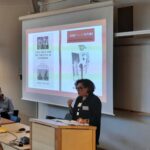
RSPH/OPG PhD candidate Tijn Sinke participated in the international conference of the Association of Political History in Södertorn (Sweden) dedicated to Political Histories of Conflict: Social Cleavages, Political Ideologies, Clashes of Sovereignty.
11th International APH Conference, 12-14 June, Södertorn (Sweden):
Political Histories of Conflict: Social Cleavages, Political Ideologies, Clashes of Sovereignty
Sometimes, when one finds oneself immersed in the life of long-forgotten thinkers or obscure social movements, the study of history can feel like something far removed from contemporary challenges. But at other moments, the weight of history on the present is glaringly obvious. It is the latter feeling that best describes the experience I underwent participating in the conference of the Association Political History, held on the campus of a university in a Stockholm suburb.
In its first years, the conference used to be aimed at PhD-students only, but since 2022 this model alternates with an event at which political historians in general can present their work. So, between Wednesday afternoon and Friday midday, the program was packed with keynote lectures and panel presentations consisting of three or four scholars with affiliated research subjects. I had the opportunity to present my research on 1970s Dutch conspiracy theories on World War II affairs (Menten, Aantjes, Velser affair), which was part of a lively panel on the far right and conspiracy theory. During the days, I have seen scholars from all corners of Europe and beyond, presenting such diverse topics as ‘Britain and Sweden during the Biafra crisis’ and ‘the concept of the ‘Bulwark of Europe’ in the Grand Duchy of Warsaw’ (from my fellow OPG-PhD candidate Adam Dargiewicz).
Although there was an enormous diversity among the presented topics, one could easily discern a couple of recurring themes, which cannot be separated from contemporary anxieties about the future of liberal democracy. First, the rise of ‘illiberal democracy’, the far right and their competing historical narratives must be named. Istvan Rév, professor at Central European University – which has seen heavy oppression from the Orbán government in Hungary – centered his keynote lecture around a particular version of ‘historical revisionism’; a conservative discourse centering around the frame of ‘totalitarianism’, obscuring differences between communism and fascism out of a fear for revolution as a means of political change. Rakesh Batabyal, a professor at the Jawaharlal Nehru University India, recalled his own experience of being sidelined by the current Hindu-nationalistic government, which very much promotes their own particular version of history.
A second recurring theme was the Russo-Ukrainian War, which continues to cause unrelenting devastation to Ukraine up to this very day. The conference had invited a couple of Ukrainian scholars, whose presentations on topics related to the war were far more emotionally charged than your usual panel discussion. Russia was clearly the ‘significant other’ of the conference: a country whose impact is felt all around the continent, but which has mentally removed itself so far from its neighbours that the chances for any meaningful conversation seem extremely dim. Furthermore, we were lucky that the renowned historian Serhii Plokhii (Harvard University) was in town. He has attempted to write the history of a war which is still going on (his ‘The Russo-Ukrainian War’ is now available in your bookshop), and explained in a fascinating lecture how he has succeeded in such an arduous project.
Serhii also addressed the role of the historian in times of war and crisis, and underlined the historian’s task to offer counternarratives to the misuses of history, and of studying the origins of war, in its geopolitical and intellectual dimensions. The final roundtable of the conference also focused on ‘the role of the historian in the present time of challenged democracy’. The participants, amongst which OPG-board member Henk te Velde, shared their thoughts and dilemmas about this topic. Not unusual for a roundtable discussion, the audience was left with more questions than answers. When is reflecting from a detached position not enough anymore, and must one begin to defend democracy in a more militant manner? How can scholars interact with a new generation of students whose own political experiences have been so different? How do we leave space for pluralism without ending up in a sort of unproductive ‘both-sides-ism?’.
These are questions every historian of contemporary politics has to reflect upon for themselves, but I am glad I have had the opportunity to learn from a wealth of different perspectives by visiting this conference in Södertorn.
Tijn Sinke

Impression of the APH Conference 2024
